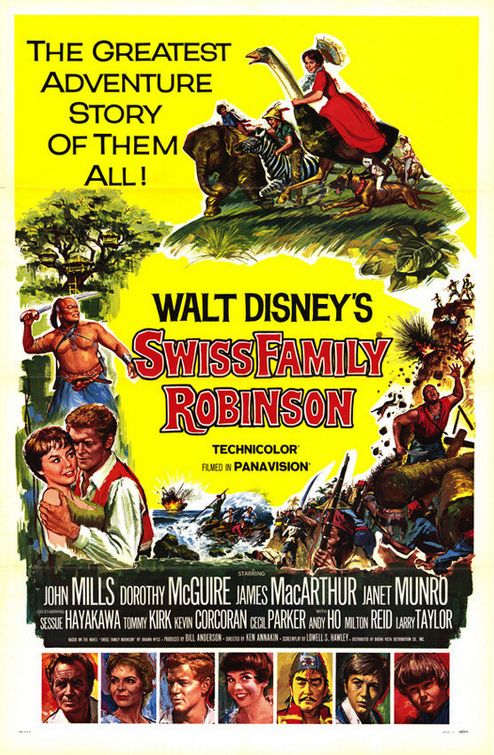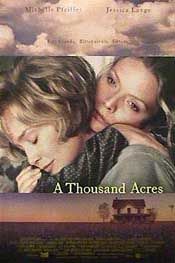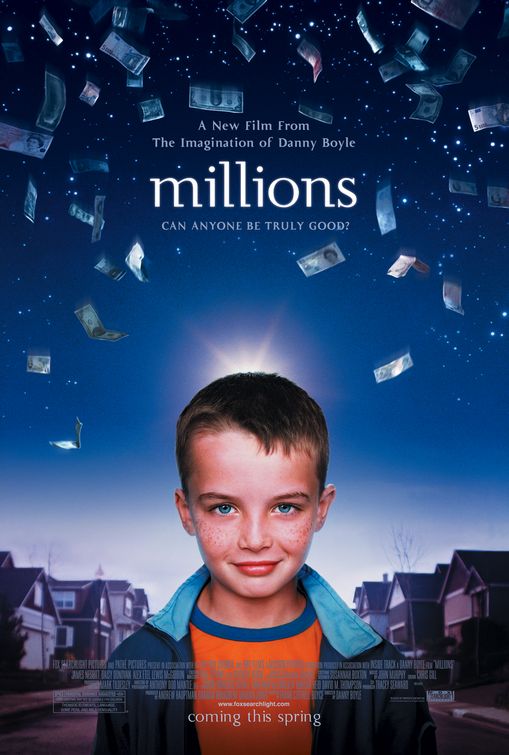"A Kingdom For a Daughter"

| None | Light | Moderate | Heavy | |
|---|---|---|---|---|
| Language | ||||
| Violence | ||||
| Sex | ||||
| Nudity |
What You Need To Know:
A THOUSAND ACRES plays like a soap-opera. Both the writer and director are from Australia, and they err when tackling mythic Americana. Though the movie doesn’t have any depicted sex and very little violence, it does have implied adultery and drunk driving leading to death. Many people will be disturbed by the fight scene at a church picnic. A THOUSAND ACRES attempts to demonstrate family problems in a genuine way, but it ends up as a tear-jerker without conviction.
Content:
(C, AB, LL, V, S, A, D, M) Mild Christian worldview of Christian family marred by deep hurt, unforgiving attitudes & ungodly acts; 15 obscenities, 7 profanities, verbal fights, & words of hatred leading to insanity; mild shoving, implied drowning & physical fighting; implied adultery & depicted adulterous kiss; upper male nudity & brief, non-sexual upper female nudity; alcohol use, drunkenness & drinking while driving; smoking; extensive miscellaneous immorality including some anti-Christian bigotry
More Detail:
From the creators of HOW TO MAKE AN AMERICAN QUILT comes another broad piece of Americana, thick in melodrama and thin on emotional weight, entitled A THOUSAND ACRES. This movie is half-baked take-off on Shakespeare’s KING LEAR, wherein wealthy patriarch Jason Robards has little to do but foam at the mouth, making the audience wonder how he built an agricultural empire in the first place. Starring the very able Jessica Lange and the usually superb Michelle Pfeiffer, the movie will have to rely on their star power to carry itself above the tall corn of the lackluster script.
Narrated by Lange as eldest and dutiful daughter, Ginny, the movie begins with Daddy (Robards) assembling all his family and telling them about his will for their very productive farm, a three way business split amongst his three daughters. Middle daughter, farmer’s wife Rose (Michelle Pfeiffer), thinks it is a good idea; Ginny thinks it is a great idea; but, little daughter, big city lawyer Caroline (Jennifer Jason Leigh), has reservations. When she expresses these reservations, she hurts Daddy’s pride, so he tells Caroline that she cannot be part of the split. Caroline retreats back to the city.
This injustice fuels a debate amongst Rose and Ginny, which starts a flood of pain and frustration to surface. Rose recently had a mastectomy and starts to attack Daddy’s cantankerous ways. She raises her voice frequently and even convinces the naive Ginny that Daddy sexually abused them when they were children. When Daddy finds out that Ginny and Rose are against him, he decides to side with Caroline and sue Ginny and Rose to get the farm back.
Throughout it all, Ginny and Rose are ostracized by their church and community as villains. Both women have an adulterous affair with a long-time friend and farm hand. Rose looses her husband in a car accident caused by drunk driving. Ginny works up the courage to leave her husband and the farm to escape to a less complicated life. A final crisis in the family leaves everyone emotionally exhausted, and the audience relieved that this drama is over.
A THOUSAND ACRES plays very much like a soap-opera in the corn. It has all the elements and all the inferior quality of one-dimensional characters fighting for typical rewards like “the farm,” “deeds,” “uncompromising love from the benevolent servant,” and finally, “the right to be happy.” Fighting for rights does not make for poor drama, but with an excellent cast such as this and a literary foundation such as Shakespeare, this movie should deliver much more than it does. Woman who have been sexually abused will not find this movie to be a great voice for their pain. It is glossed over, just like Daddy’s insanity.
Lange and Pfeiffer do well with their material, but Jason Leigh and Robards are very derivative. The problem doesn’t reside with the actors as it does with the writing and directing. Both the writer and director are from Australia, and when tackling mythic Americana, they miss the boat. This is a script that could have been placed in any location, but in attempting to speak to Americans about Americana, they miss out on some genuinely needed realism. Movies like FIELD OF DREAMS and the older GIANT starring James Dean, both capture the land, time and place and use it as a major contributing factor to the story.
Though the movie doesn’t have any depicted sex and very little violence, many people may be disturbed by the fight scene held during a church picnic. The pastor, seemingly a holy and devout man, gives an adequate, if shallow prayer, but one member of the congregation immediately takes the opportunity to stand up and defame Ginny and Rose. The ladies’ husbands immediately object, and a brawl ensues. Both the defaming and the fighting taint the Christian and wholesome nature of church picnics, which go on all across America nearly every week, without incident and with great love and joy. The director seems to suggest that Daddy couldn’t have done any of the horrible things that his daughters say he did because he “goes to church.” Now, Christians know that even church people do horrible things, and that the Good News is that salvation is in Jesus Christ not man, but this movie is another example of taking pot shots at the church without any balance. The movie suggests that Christianity not only can’t prevent a man from doing grave harm to his family, but it also blinds the eyes of otherwise good people. It is Christianity as the great placater, and that is downright false for the Gospel offers all men and women who have fallen short the salvation which is only available in the salvific sacrifice of Jesus Christ.
A THOUSAND ACRES is an honest attempt to demonstrate family problems in a genuine way, but it ends up as a tear-jerker without conviction or a soul. Even so, Pfeiffer, who bears extreme rage throughout the movie, is a long shot Academy Award nominee next year.



 - Content:
- Content: 



